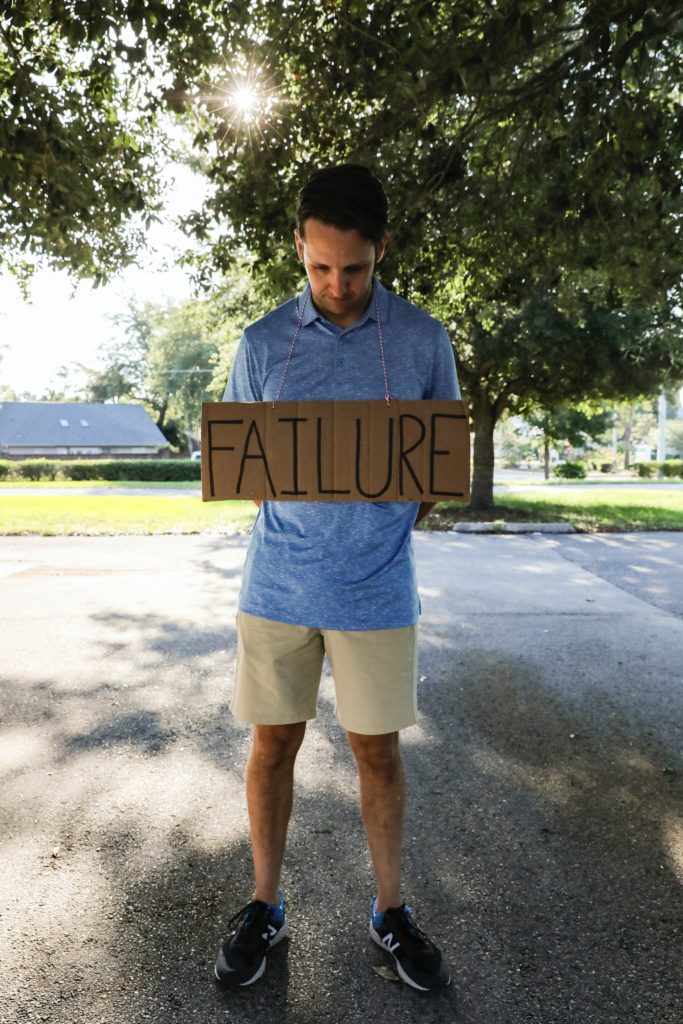I’d just passed the imaginary finish line (a crack in the sidewalk in front of my house) after running 30 miles on my 30th birthday. A trainer from the gym who was among the handful of finish line fans said, “Congratulations, you’re officially an ultra-marathon runner!” I laughed awkwardly to deflect the praise as my non-runner friends burst into applause.
Despite having just run 30 miles, I wasn’t yet ready to call myself a runner, let alone an ultra-marathon runner.
I’ve run a lot since that first 30-mile race. My highlight reel and list of accomplishments afford me more than a few bragging rights, so why can’t I call myself a runner?
The answer is (sort of) simple: imposter syndrome.
Already know about imposter syndrome? Skip to the solutions.
What is imposter syndrome?

The term imposter syndrome was first coined in a 1978 study at Georgia State University. Initially, researchers thought feeling like a fraud despite being outwardly successful was something that only afflicted women, particularly college educated women. But subsequent studies have found that imposter syndrome can affect anyone, though some of us might be more likely to suffer from pervasive insecurity than others.
If you’ve ever felt insecure, underserving, unworthy, incompetent, or fearful that people are going to find out “the truth” about who you are despite being highly successful, then you’ve likely experienced imposter syndrome. The good news is you’re not alone.
At least 70% of adults will experience imposter syndrome at least once in their lives, according to Jaruwan Sakulku whose study was published in The International Journal of Behavioral Science.
Why do we experience imposter syndrome?
Although there are many reasons why a person might feel underserving, there are some factors that might make you more likely to experience imposter syndrome.

- Upbringing—Studies have found that children who grow up in competitive households, in families that put extra emphasis on achievement, or receive feedback that is inconsistent with their performance (overinflated praise or undermined success) can become adults who feel that no matter what they do, it’s never good enough.
- Being Different from Your Peers—If you find yourself an outlier at work, school, or in whatever field you’re using as a measure of success (such as running), you might be more likely to feel like an imposter. The situation can be even more pronounced if you experience discrimination as a result of your difference (you might feel you have to work harder to prove yourself if your peers perceive you as inferior just because you’re different.)
- Perfectionism—If you have to get everything right, chances are you’ve set the bar for success impossibly high, which means no matter what you do, you’ll think you’ve fallen short.
- Lack of Confidence—even when an external indicator of success is present (like an award or degree), people with imposter syndrome struggle to believe the achievement is a result of something inside of themselves (like intelligence or athleticism.) Instead, they attribute success to something outside of themselves or beyond their control (like luck or good timing.) Even when they’ve done something well, imposters might think, “I’ll never be able to do that again,” because they don’t have confidence in their inherent skills.
Unpacking Imposter Syndrome

Why wasn’t I able to own the title “ultra-marathon runner” after crossing the finish line of an ultra-marathon? Why do I still struggle to call myself a runner? Perception.
The trainer who crowned me with the title of “ultra-marathon runner” had run multiple 50 and 100-mile races (no extra zeros there—the woman had run one hundred miles at one time, in a single race. It’s something that she did regularly, like going on vacation.) Before I met Tara, I didn’t know 50 and 100-mile races existed. When she called herself an ultra-marathon runner (a title that she clearly deserved), unconsciously, I made her the standard.
To be “worthy” of the name “ultra-marathon runner,” I thought I had to be like Tara (or better than Tara, if such a thing is possible.) That meant I’d have to run marathons (26.2 miles) on weekends and I’d have to regularly compete in 50 or 100-mile races.
I dismissed the title “ultra-marathon runner” immediately because one 30-mile run wasn’t even close to 50 or 100 miles and it wasn’t something I planned to do regularly.
How could I exist in the same runner category as Tara? (Lesson one: don’t compare yourself to others.)
Why can’t I own the title of runner?

I grew up by Boston and watched elite runners cross the finish line of one of the world’s most popular marathons every April. Early on, I formed ideas about what it meant to be a runner. I thought runners were: thin, muscular, able to finish a marathon in under three hours, people who ran at least five days a week, people who are actively committed to the sport of running (setting personal records, competing with others, entering dozens of races every year, participating in runner groups or communities.)
How could someone who runs when she feels like it, doesn’t wear a watch or time herself, doesn’t care about winning, runs at the back of the pack, doesn’t have an upper-thigh gap and has to slather on anti-friction cream to prevent chub rub, hasn’t run with a group since high school, and doesn’t set any long-term goals (in running or otherwise) consider herself a runner?
Well, friends, if you’ve stayed with me this far, keep reading and I’ll tell you how anyone (even slow-running Carrie) can go from an imposter, to someone who is proud of her accomplishments.
How to Combat Imposter Syndrome and Own Your Achievements

You recognize that you have imposter syndrome, what can you do about it? Here are some ideas:
- Talk to Friends—if over 70% of us have experienced imposter syndrome at least once, chances are if you start talking about it to your friends, they’ll be able to relate. If there’s one way to banish feelings that you’re uniquely inadequate, it’s realizing that everyone else in the room—including the woman who has run multiple ultra-marathons—feels the same sense of inadequacy.
- Talk to a Therapist—while imposter syndrome doesn’t meet DSM criteria for being a mental disorder, a therapist can help you address and overcome some of the underlying issues that might be present and preventing you from owning your awesomeness. It’s also important to note that ongoing, pervasive imposter syndrome can occur in conjunction with other diagnosable and serious mental health issues such as anxiety and depression.
- Focus on Your Achievements—this one is probably the hardest for people with imposter syndrome, but I have faith in you (just not in me.) Start by making a list of the things you’ve accomplished, awards you’ve achieved, or goals you’ve met. Next, notice and acknowledge what you’ve done (this might be harder than it sounds.) The important caveat: don’t compare your list to anyone else’s. There will always be someone better (and worse) than you at what you do. Stop comparing yourself to others and instead, focus on where you are now and where you want to go next.
- Set Realistic Goals—If you think the only way you’ll ever be a runner is to adopt the extreme lifestyle of elite marathon finishers, you’ll never feel good enough, no matter what you accomplish. Don’t set the bar so high. Focus on what’s realistic for you. Spending 25 hours a week training is probably not practical for most of us, but what is? You get to decide.
- Give Yourself Permission to Fail—the perfectionists among us will have the hardest time with this one, but I’ll let you in on a secret… no one is perfect. Trying to reach a level that is unattainable and beating yourself up for not being able to reach an impossible standard of excellence is a sure way to feel bad. So stop doing that! I know it’s easier said than done, but from one perfectionist imposter to another: I give you full permission to fail. Try this for fun: write yourself a failure permission slip (be sure to sign it for extra authority) and post it somewhere visible. Here’s mine: “I, Carrie, give myself full and total permission to be an absolute failure at everything I do, especially running.” See how seriously you take yourself after a statement like that.
- Practice Owning Your Awesomeness—the next time you meet someone new and they ask the perennial (and dreadful) question, “What do you do?” tell them the title you’ve always wanted for yourself, but haven’t ever been able to own. Resist the urge to add in excuses, fillers, or apologies. Here’s an example: “Hi, I’m Carrie, I’m a runner.” Start with strangers, then try it with friends, and, when you’re ready, say it to your peers. In time, you’ll be able to say it, and mean it, to yourself.
Have you ever experienced imposter syndrome? Do you have suggestions for how to overcome imposter syndrome? Want to practice introducing yourself to an internet filled with strangers? Leave a comment below. I’d love to hear from you.





One thought on “I Run But I’m Not a Runner: Imposter Syndrome and What to Do if You Have it”